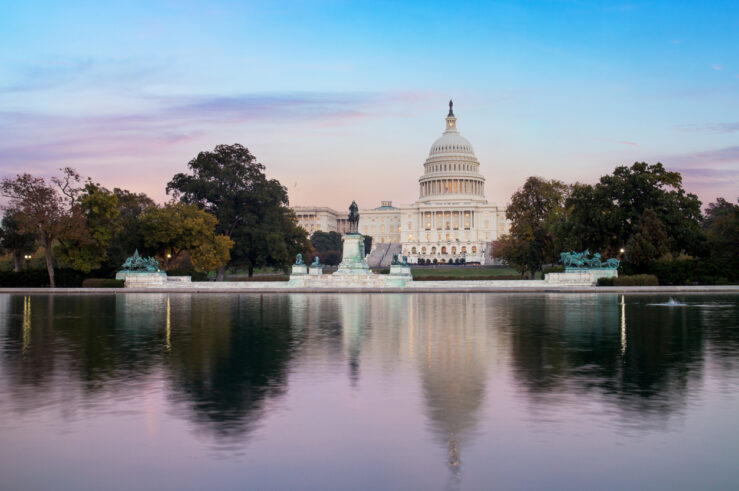Showing results for: “google”
The Woman in the High Office
May 2007, Palo Alto The California sun shone warmly on Eric Schmidt’s face as he stepped out of his car and made his way to have dinner at Madera, a chic Palo Alto restaurant. Dining out was a welcome distraction from the endless succession of strategy meetings with the nitpickers of the law department, which ... The Woman in the High Office
Verses on Self-Preferencing
About earth’s creatures great and small,Devices clever as can be,I see foremost a ruthless power;You, their ingenuity. You see the beak upon the finch;I, the beaked skeleton.You see the wonders that they are;I, the things that might have been. You see th’included batteriesI, the poor excluded ones.You, the phone that simply works;I, restrain’d competition. ’Twould ... Verses on Self-Preferencing
AICOA Is Neither Urgently Needed Nor Good: A Response to Professors Scott Morton, Salop, and Dinielli
Earlier this month, Professors Fiona Scott Morton, Steve Salop, and David Dinielli penned a letter expressing their “strong support” for the proposed American Innovation and Choice Online Act (AICOA). In the letter, the professors address criticisms of AICOA and urge its approval, despite possible imperfections. “Perhaps this bill could be made better if we lived in ... AICOA Is Neither Urgently Needed Nor Good: A Response to Professors Scott Morton, Salop, and Dinielli
The Competition and Transparency in Digital Advertising Act Is Fatally Flawed
The Competition and Transparency in Digital Advertising Act (CTDAA), introduced May 19 by Sens. Mike Lee (R-Utah), Ted Cruz (R-Texas), Amy Klobuchar (D-Minn.), and Richard Blumenthal (D-Conn.), is the latest manifestation of the congressional desire to “do something” legislatively about big digital platforms. Although different in substance from the other antitrust bills introduced this Congress, ... The Competition and Transparency in Digital Advertising Act Is Fatally Flawed
How Tech Startups Could Be a Casualty of the War on Self-Preferencing
We will learn more in the coming weeks about the fate of the proposed American Innovation and Choice Online Act (AICOA), legislation sponsored by Sens. Amy Klobuchar (D-Minn.) and Chuck Grassley (R-Iowa) that would, among other things, prohibit “self-preferencing” by large digital platforms like Google, Amazon, Facebook, Apple, and Microsoft. But while the bill has ... How Tech Startups Could Be a Casualty of the War on Self-Preferencing
NetChoice, Net Neutrality, and the Future of the First Amendment Online
In an expected decision (but with a somewhat unexpected coalition), the U.S. Supreme Court has moved 5 to 4 to vacate an order issued early last month by the 5th U.S. Circuit Court of Appeals, which stayed an earlier December 2021 order from the U.S. District Court for the Western District of Texas enjoining Texas’ ... NetChoice, Net Neutrality, and the Future of the First Amendment Online
The FTC UMC Roundup – May 27 Edition
Welcome to the Truth on the Market FTC UMC Roundup for May 27, 2022. This week we have (Hail Mary?) revisions to Sen. Amy Klobuchar’s (D-Minn.) American Innovation and Choice Online Act, initiatives that can’t decide whether they belong in Congress or the Federal Trade Commission, and yet more commentary on inflation and antitrust, along ... The FTC UMC Roundup – May 27 Edition
The Market Challenge to Populist Antitrust
The wave of populist antitrust that has been embraced by regulators and legislators in the United States, United Kingdom, European Union, and other jurisdictions rests on the assumption that currently dominant platforms occupy entrenched positions that only government intervention can dislodge. Following this view, Facebook will forever dominate social networking, Amazon will forever dominate cloud ... The Market Challenge to Populist Antitrust
The ABA’s Antitrust Law Section Sounds the Alarm on Klobuchar-Grassley
Sens. Amy Klobuchar (D-Minn.) and Chuck Grassley (R-Iowa)—cosponsors of the American Innovation Online and Choice Act, which seeks to “rein in” tech companies like Apple, Google, Meta, and Amazon—contend that “everyone acknowledges the problems posed by dominant online platforms.” In their framing, it is simply an acknowledged fact that U.S. antitrust law has not kept ... The ABA’s Antitrust Law Section Sounds the Alarm on Klobuchar-Grassley
Attention Markets: They Know Them When they See Them
A raft of progressive scholars in recent years have argued that antitrust law remains blind to the emergence of so-called “attention markets,” in which firms compete by converting user attention into advertising revenue. This blindness, the scholars argue, has caused antitrust enforcers to clear harmful mergers in these industries. It certainly appears the argument is ... Attention Markets: They Know Them When they See Them
Assessing Less Restrictive Alternatives and Interbrand Competition in Epic v Apple
The International Center for Law & Economics (ICLE) filed an amicus brief on behalf of itself and 26 distinguished law & economics scholars with the 9th U.S. Circuit Court of Appeals in the hotly anticipated and intensely important Epic Games v Apple case. A fantastic group of attorneys from White & Case generously assisted us ... Assessing Less Restrictive Alternatives and Interbrand Competition in Epic v Apple
In Apple v Epic, 9th Circuit Should Remember that Antitrust Forbids Enhancing, not Exercising, Market Power
On March 31, I and several other law and economics scholars filed an amicus brief in Epic Games v. Apple, which is on appeal to the U.S. Court of Appeals for Ninth Circuit. In this post, I summarize the central arguments of the brief, which was joined by Alden Abbott, Henry Butler, Alan Meese, Aurelien ... In Apple v Epic, 9th Circuit Should Remember that Antitrust Forbids Enhancing, not Exercising, Market Power
















